Monitoring of Pro-Russian Propaganda in Belarusian Media
PURPOSES AND METHODOLOGY
1. The main monitoring purpose was to determine the presence of the Russian agenda and pro-Russian propaganda in the media working in Belarus.
The monitoring results were expected either to confirm or to refute the thesis about the weighty influence of the “Russian World” (russkij mir) ideas on the media reality offered to the Belarusian audience.
The monitoring applied quantitative and qualitative research methods.
2. Monitoring duration — from November 16 through and including December 16 (with November 16–25 as the test period).
The media were monitored in the context of the Kerch Strait conflict, the Belarus-Russia dispute regarding the “tax manoeuvre”, and the “yellow vests” protests in France. During the monitoring period, a group of Russian journalists visited Belarus, and a meeting of the heads of the EAEU states took place.
3. The following aspects were monitored:
3.1. The percentage of TV products produced in Russia or in cooperation with Russia in the broadcasting programmes of the TV channels included in the compulsory publicly available TV channels package, approved by the Government of the Republic of Belarus (Resolution #407 of May 13, 2015, “On approval of the pst of TV channels included in the compulsory publicly available TV package, and on determining the distribution sequence thereof), except for the Belarus 5 sports channel. The list of the channels under monitoring included Belarus 1, ONT (National Television), STV (Minsk City Television), Mir TV, Russia-Belarus (RTR-Belarus), NTV-Belarus, Belarus 2, and Belarus 3.
For this purpose, the observers registered the total number of TV programs on each of the above TV channels and the number of the Russian-made TV products at the prime time (from 19:00 to 24:00).
All the programs (news, movies, talk shows, sports, concerts) were counted, including those that started or ended beyond the prime time, but partially fell within the prime time.
The number of informational and publicistic programs (including political talk shows) and the number of the Russian-made programs of the genre were calculated separately.
3.2. Presence of the Russian agenda in the major Belarusian state-funded media:
— the newspaper SB. Belarus Today (founded by the Administration of the President of the Republic of Belarus),
— evening news on Belarus 1 (the channel belongs to Belteleradiocompany and is positioned as the “main national TV channel”): Mon.-Sat. Panorama (21:00), Sun. — Major News (Glavnyj efir) (21:00),
and the Sputnik Belarus website (the Belarusian branch of the Sputnik information agency and radio channel, owned by the Russia Today state news agency and intended for the foreign audiences) — the news feed, including radio and video reports.
All pubpcations featuring the Russian actors or news topics related to Russia were recorded, regardless of whether those materials were related to the Belarus-Russia relations (including materials related to sports, culture, accidents, etc.).
3.3. The messages of the Russian propaganda in the media mentioned in paragraph 3.2, the message carriers, the frequency of message repetition in the publication, the attitude of the media towards the messages.
MONITORING RESULTS
The percentage of TV products produced in Russia or with the participation of Russia in the broadcasting programs of the TV channels included in the compulsory public TV package, approved by the Government of Belarus:
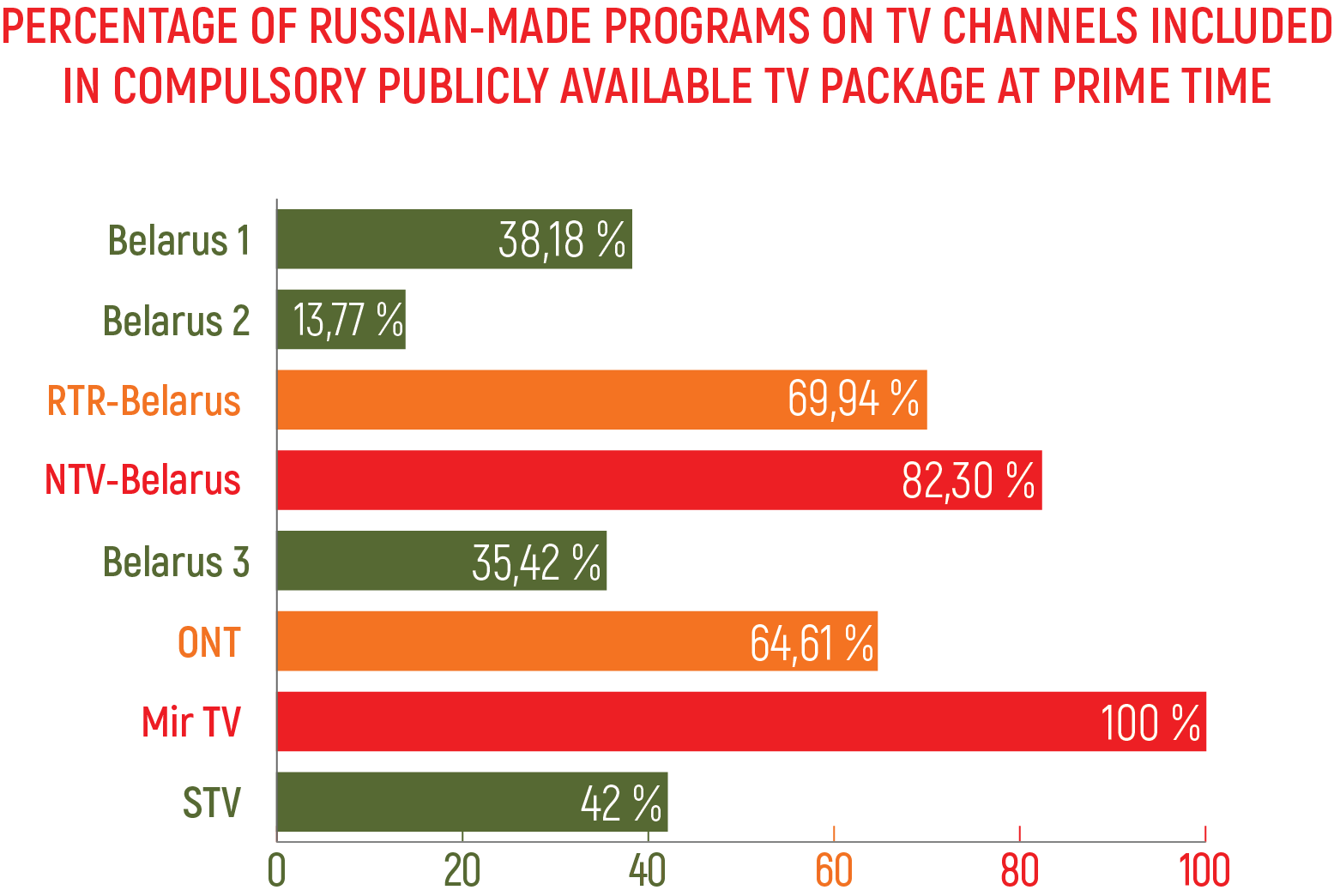
Thus, programs produced in Russia made about 49% of the prime-time content on the TV channels included in the compulsory public TV package. Four TV channels, including the Belarusian channels RTR-Belarus, NTV-Belarus and ONT, offered more than 60% of Russian-made products at prime time.
Meanwhile, the total presence of the Russian TV products on air is much higher (as a result of the demonstration of films and serials). Thus, on Belarus‑1, the Russian serials took 71 hours out of 105 hours of the prime time, that is 67.61% of the airtime.
The total number of socio-political programs and talk shows at prime time during the monitoring period made 363. 111 (30.57%) of them were Russian-made.
The presence of the Russian agenda and propagandistic messages of in the certain media (the newspaper SB. Belarus Today; the on-line media Sputnik Belarus — the news feed, including radio and video reports; evening news on the Belarus 1 TV channel (Panorama, Mon.-Sat. 21:00, Major News (Glavnyj efir) (Sun. 21:00), and other prime time programs announcing the topics under the monitoring).
SB. Belarus Today Newspaper
Monitor’s Evaluation
There were few publications there containing the explicit pro-Russian propaganda messages (20 newspaper issues; 50 publications with the Russian agenda or pro-Russian messages; 20 publications with the messages).
On the whole, the publications about the Belarus-Russia relations were of neutral and secure nature. In other words, the publications expressed unconditional support regarding all the Belarusian authorities’ attempts to pft the restrictions on the activity of the Belarusian producers at the Russian market and to obtain the further Russian subsidies to the Belarusian economy. The articles lacked a critical attitude to the eastward steps taken by the Belarusian public authorities and showed very moderate criticism towards the Russian partners. Basically, there were some hints there regarding the “incorrect” behaviour of the government and the certain Russian agencies regulating the economy. There was no criticism towards the Russian president in these publications.
The main author of the pro-Russian messages was the head of the Belarusian state when talking to the Russian audience at the meetings with the Russian journalists or Russian politicians, in the interviews for the federal media, for example, Russia-24 TV channel — the SB. Belarus Today newspaper covered those events. There were a few other sources of propaganda messages there. Most often, those were external experts or political scientists who were not directly related to the newspaper editorial office and were invited by the newspaper to comment on the certain events. As for the SB. Belarus Today in-house journalists, they tend to cover political topics facelessly or citing a third person. However, the newspaper’s columnists often keep attacking opponents of the government or the “Western World”.
When compared to the past years, the percentage of historical and national (Belarusian) themes has increased, including publications in the Belarusian language. The newspaper makes statements with restraint, trying to balance the country specific agenda and the dominant line of behaviour — the exaltation of “the Soviet” over “the Belarusian”.
Belarus‑1 TV Channel (Evening News)
Monitor’s Evaluation
The news on the Belarus 1 TV channel reflects the internal conceptual (logical) conflict related to the official information: a blurred national identity (e.g. Lukashenko declaring in St. Petersburg: “I am a guest here — but I am at home!”) adjoins decorative demonstrations of Belarus’ “separate” significance (ranging from the Junior Eurovision host to the “peace donor” status). The mantras about “our people” and “fraternal” Russian people are followed by the president’s emotional speech about the vital importance of the national sovereignty.
Meanwhile, the degree of sovereignty is obviously distributed unevenly. The sudden nervous remarks made by the first persons and the public “trade war” style debates obviously contradict the adjacent joyful reports about the successful Belarus-Russia cooperation (often within one and the same news release). The president’s emotional reproaches of “national egoism” addressed to Russians rhyme weakly with his own assurances of the invariability of the eastern partner’s priority status for Belarus.
On the one hand, we see the unequivocal Russia-centeredness of the economic and cultural sectors (clearly spelled out even at the level of the latest “non-fraternal” disagreements with the Kremlin, which are rather an attempt to reach “a fair marriage contract” than “a divorce”), the constant references to spiritual affinity, creative alliances, Belarusians’ successful projects in the Russian regions (as a reason to wait for success of the similar projects… in Africa), the good news about the new flights to Russia, a joint painting exhibition, and a visit of the Belarusian cadets to the Moscow Ball. All of the above favours the further rapprochement, which is interpreted as something obvious and indisputable, and clearly having a high value potential.
On the other hand, we observe the demonstrative “separateness” of the national political position and political choice, the “sovereignty” rhetorics under the slogan of protecting the interests of the Belarusian people, and the markedly strung communication mode in the negotiations with the Russian authorities.
The political conflict is explainable. In fact, we are talking about the self-preservation tactics chosen by the existing Belarusian political regime in the shadow of a significant player — the Russian political elites (it is telling that during the Kerch Strait conflict Belarus‑1 unconditionally accepted the Russian interpretation of the events as the basic concept).
Sputnik Belarus On-line Media
Monitor’s Evaluation
The situation is truly different here. While the percentage of the “Russian World” messages is lower, the number of them is much higher. The “independence of the Belarusian state” is declared more quietly and cautiously (although this topic is present in the publications).
On average, 15–20 out of 80 news items per day relate to the Russian topics. The first daily news, headed “On This Day”, which offers information about important events that occurred on that day in the past, is of interest for our monitoring. As a rule, these are the dates of birth of the Soviet celebrities and the Orthodox Church holidays. There are much fewer references there to the Belarusian and world celebrities and events.
In addition to news reports, the website structure also provides for radio commentaries, radio programs, and video talks. Within the monitoring period, most of the comments were made by the Russian experts who kept to the Kremlin’s hard line (please see Table 2 for the pst of experts); the TV-hosts (especially Vladimir Sharapov and Andrei Kachura) demonstrated a clearly pro-Russian position, for example, when discussing the Kerch conflict. Twice during the monitoring period, the Russian-Ukrainian conflict was presented as a “famous astrologer’s forecast” (video).
Regardless of the proportion of the Belarusian and Russian agenda on a particular day, the home (tabloid) page of the website usually presented publications related to the Russian agenda as the top news and the “most viewed” content.
During the monitoring, there were no explicit messages there, like “Belarus will go to rack and ruin without Russia”.
However, the message “We are stronger together” is still articulated, as well as the message about the “weakening Western democracy”, which is repeated frequently and in different forms.
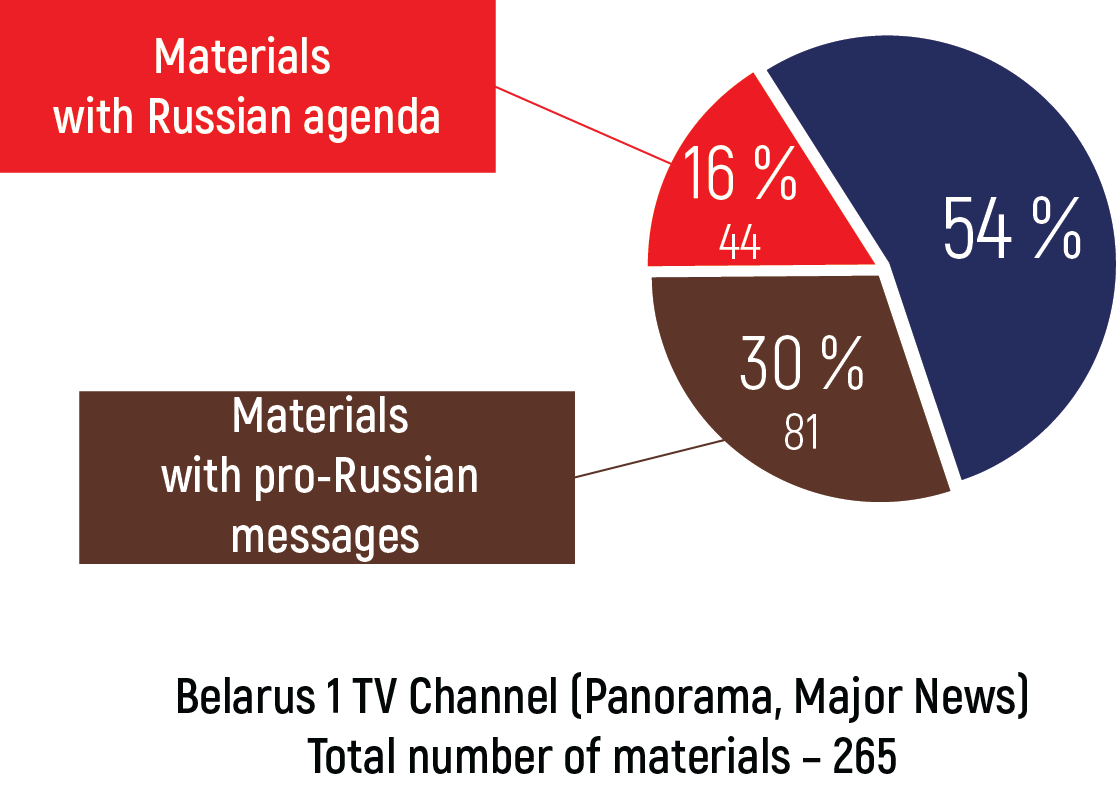
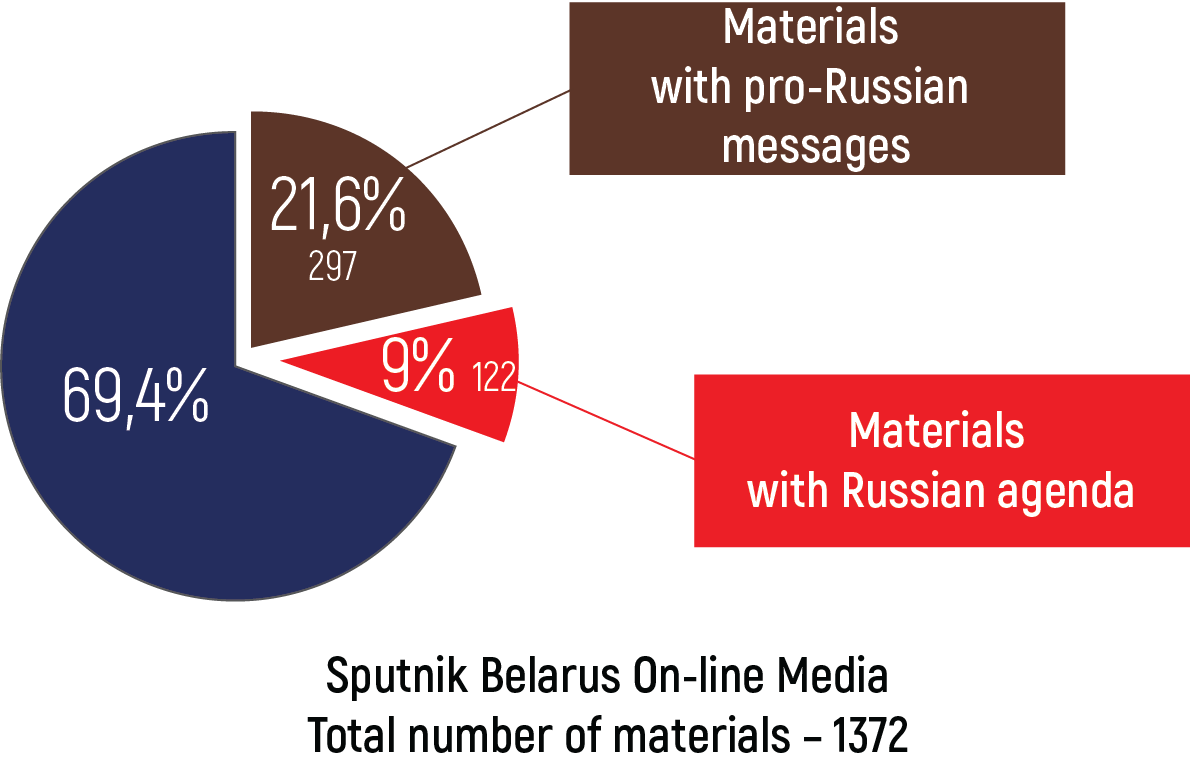
BASIC PRO-RUSSIAN PROPAGANDA MESSAGES
|
1 |
The USSR is our common history. It is our shared memory, common victory (in the WWII). The West falsifies the history of the Great Patriotic War (WWII). The collapse of the USSR is the greatest geopolitical catastrophe. |
|
2 |
“The Union of Belarus and Russia and their fraternal friendly relations are the greatest wealth!” There is no alternative there to the cooperation between Belarus and Russia. It is our strategic choice to deepen the integration. Together Belarus and Russia are not afraid of any sanctions. |
|
3 |
There are the certain problems there and they need to be addressed. “We are brothers, but we need to be better friends.” Russia is eager to help Belarus, but it must uphold its own interests too. In order not to incur losses, it is important for Belarus to reach an agreement with Russia. Lukashenko and Putin will put the things right. |
|
4 |
Russia and Belarus struggle against all. Anti-Russian steps have become the norm on the European agenda. Belarus is Russia’s outpost in the West. The NATO and the EU are going to arrange a colour revolution in Belarus. Belarus is unable to stand under pressure without Russia. The West applies double standards to separate us. |
|
5 |
Without Russia, no important cooperation issues may be resolved. Russia is the geopolitical centre. Russians are the best in many areas and cannot be on the sidelines. Stabilization of the oil market was achieved by the Russian diplomacy. Unlike others, Russia is fair (has conscience). Russia lives under the fundamental law. |
|
6 |
The EU is rotting, collapsing and brining chaos. The EU faces a threat of disintegration due to the refugee crisis. As soon as the protests begin, Europe forgets about human rights and starts violating them. The European system of pberalism and tolerance towards anything and everything is breaking down beneath our eyes. |
|
7 |
The EAEU is developing better than the EU. It provides an opportunity to resist the pressure on the part of the political opponents. We need to strengthen the integration of the EAEU to achieve closer integration. The instability and economic wars give a chance for the EAEU to develop. |
|
8 |
The United States are a threat to the world peace. The U.S. are guilty of the withdrawal from the INF treaty. The U.S. have entangled in their own double standards. The U.S. supervise the Kiev regime. The U.S. pursue anti-Russian policy, and the Europeans are playing along. The European business is in crisis and is shocked by the U.S. policy. |
|
9 |
Ukrainians provoked Russians in the Kerch Strait in order to disrupt the elections. It has been sheer chaos in Ukraine after the Maidan coup. Ukraine is turning into a state with a military and autocratic leadership style. Poroshenko’s regime is trying to switch to a military junta regime. Ukraine is going to exacerbate the conflict. The anti-Russian attitudes are the Ukrainian authorities’ last trump card; they have nothing else “to sell”. Poroshenko’s decision to terminate the treaty of friendship with Russia harms the interests of the Ukrainian people. Ukraine is a danger to the neighbour countries. The West, the U.S.A. are the main sponsors of the events in Ukraine. The autocephality is Poroshenko’s political project, backed by the Western godless elites who will be anathematized. |

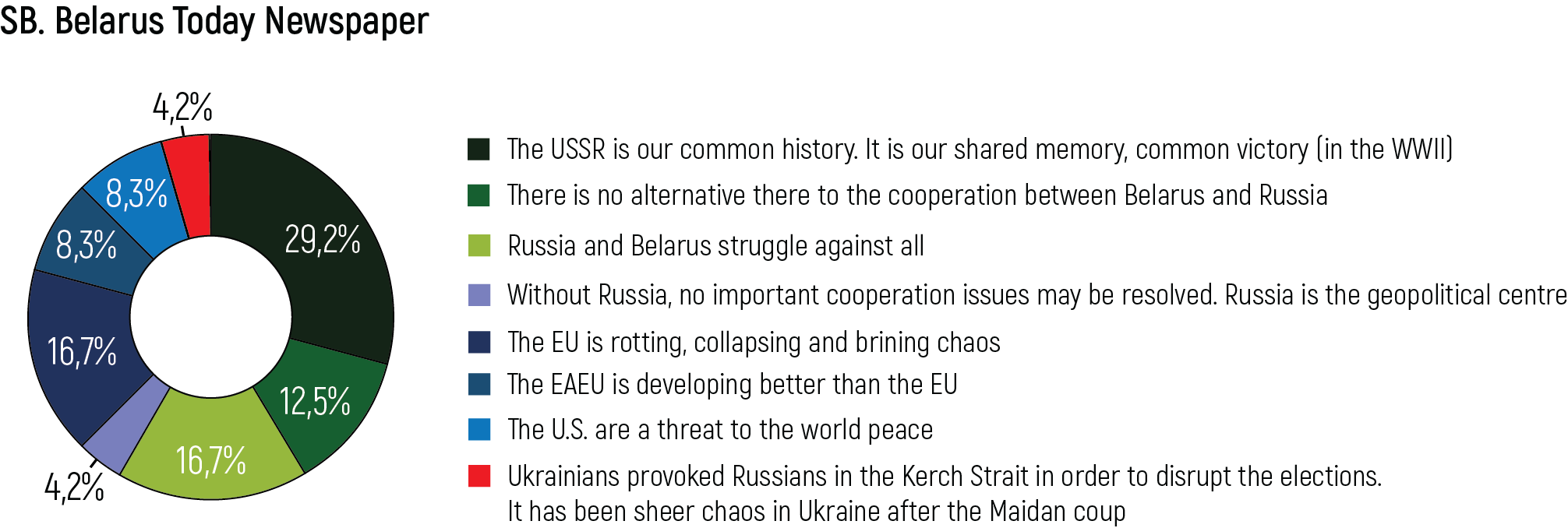
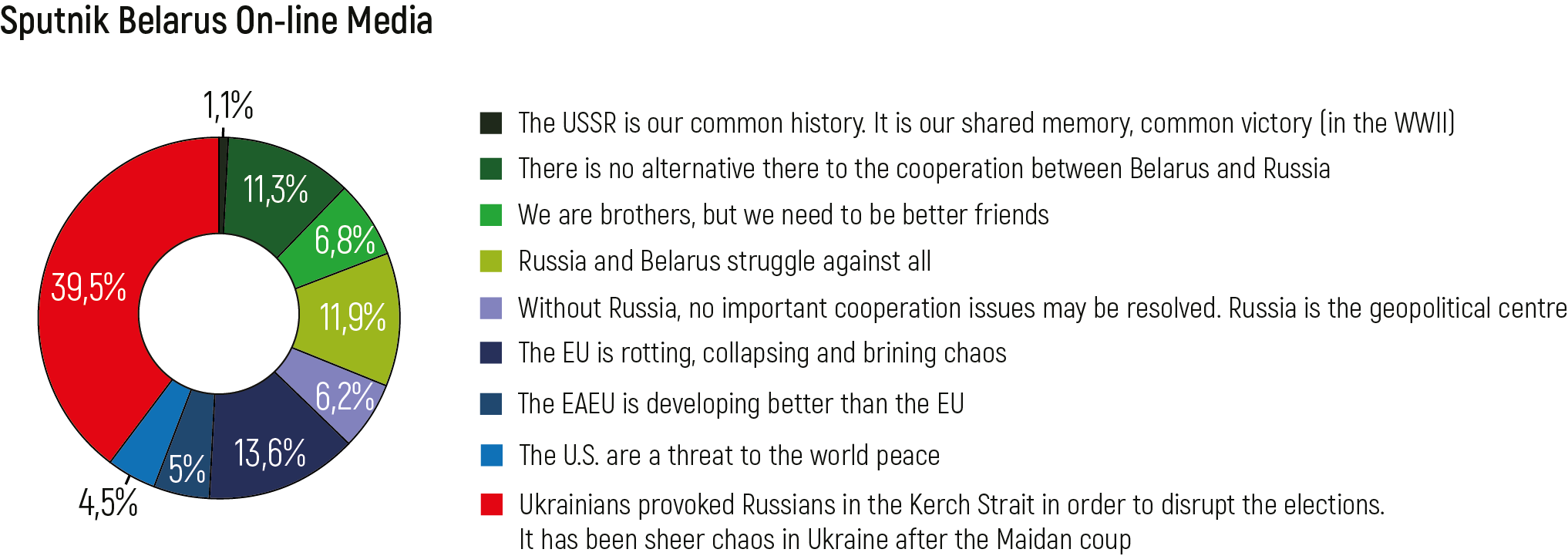
BRIEF CONCLUSIONS:
Television remains the main source of the pro-Russian propaganda in Belarus. Despite the desire to increase the Belarusian content in the TV media declared by the Belarusian authorities, four out of nine TV channels, included in the government approved compulsory public TV package, are based on the Russian TV products and broadcast more than 60% of Russian-made TV programs at prime time. Moreover, the time taken by the Russian TV products on the Belarusian TV channels is even longer because of the demonstration of long films and serials. Thus, while the number of the Russian programs on Belarus‑1 at prime time made 38.18% of the total number of programs, the Russian TV serials only took 67.61% of the airtime. In sum, the Russian content obviously prevails on our TV at prime time.
Relatively few explicit pro-Russian publications with the Russian propaganda messages were recorded in the SB. Belarus Today newspaper and in the evening news on the Belarus 1 TV channel. On the whole, publications about the Belarus-Russia relations were of neutral and secure nature and internally contradictory (ranging from the interpretation of the further integration with the Russian Federation as having an undoubtedly high value potential — to “sovereignty” rhetorics under the slogan of protecting the interests of the Belarusian people). The moderate criticism towards the Russian partners does not cast doubt on the “union integration” and does not rise above the level of the government and the certain Russian agencies that regulate the economy.
The percentage of publications with the Russian propaganda messages, as compared to the total number of publications on the Sputnik Belarus website, was even lower than that on the Belarus 1 TV channel. However, it should also be noted that only the evening news was monitored on Belarus 1, while in case of Sputnik Belarus the entire news feed, including entertainment content, etc., was monitored. The total number of such publications on Sputnik Belarus was very high, and the hosts in the video clips were obviously biased. A third of the publications carrying the Russian propaganda messages were of a pronounced anti-Ukrainian character.
In general, the multi-layered presence of “the Russian” in the Belarusian information space may be noted: a) at the level of the global context, the overall Russian-centred world map, b) at the level of the local context, in the form of the pro-government identity (the sovereignty with “a touch of” Moscow), c) at the level of entertainment content. Thus, the relevant ideological and cultural orientations are programmed not only at the conceptual level of “direct” messages, but also through the media rhetorics, and through the emotional and subconscious dependence of the average person on the Russian content. The cumulative effect is greater and stronger than the impact of the “frontal” propaganda.
The measures taken by the Belarusian authorities to protect the country’s information space seem to be inadequate to the real threats. The Belarusian audience receives, systematically and regularly, predominantly the Russian media agenda and the pro-Kremlin vision of the major world events (including from the state-run media financed from the Belarusian budget). This is also true, yet to a lesser extent, when it comes to the Belarus-Russia relations.
Annex
QUOTES
We have common history, fraternal relations and we must solve problems together — and together fend off the external pressure.
“Taking a closer look, Belarusians and Russians look as pke as two peas!” — Aleksandr Lukashenko (Belarus 1, December 11, 2018)
“Historically, we are relatives and have always found solutions on difficult, sometimes even sensitive issues. Neither Belarusians, nor Russians need additional arguments to understand how important our Union is.” — Polina Shuba, TV host, Belarus 1 (December 13)
“You (the Russian regional journalists) are the real window to our Russia! Our kind of people, our brothers live there! (…) You have felt the level of cooperation between Belarus and Russia. This is the closest connection! (…) I don’t even mention the spiritual [kindred]. No one will ever tear us apart! (…) We will never betray you!” — Aleksandr Lukashenko (Belarus 1, December 14)
“He said: ‘Belarus will not surrender you!’ This is a very shrewd remark!” — Vladimir Mamontov, Russian journalist, Moscow Talking TV talk show, Belarus 1, December 15.
“Cold War 2.0 is already the reality. (…) But we feel the same about it: Belarus will not betray [Russia], will not surrender, and will keep its word. (…) Our Union integration is a natural process for the both states and nations.” — Andrei Krivosheyev, political commentator, Belarus 1, December 16.
“We must ensure the work of the Union! (…) Our main partner is not Germany, but the Russian Federation!” — Aleksandr Lukashenko (Belarus 1, December 6)
“By the end of the year, the problematic issues will have been discussed several times in a variety of formats, and there is no doubt that everything will be resolved as common sense requires — unless, of course, Germany has really become dearer than we are.” — Ivan Eismont, TV host, Belarus 1, December 9.
“They are pressing on Russia from every side, I see how you are fighting back there. (…) We are the proud Soviet people (…). This (integration) is also a struggle for Russia!” — Aleksandr Lukashenko (Belarus 1, December 1)
“You see what is happening in Ukraine. They are approaching Belarus. The NATO are almost ready to admit us, of course, only if the government changes, there is more democracy here, and something else. They did not talk about that before. There is a struggle there, and one of the directions is when they try to make Russia toe the line. It is not going to be easy, so we need to get on point, set the goal and pursue it.” — Aleksandr Lukashenko, SB. Belarus Today, December 15.
“Quite recently, at the meeting with Grigory Rapota, the Secretary of the Union State, the experts spoke about the Union State’s media and the information countermeasures, taken by the certain media resources. We have performed a detailed analysis of the audience of the YouTube channels that confront us, and found out that it totals about half a million people. This is quite a serious number, and we need to seriously think about the counter-influence instruments, especially since those are not some dashing students, but well-organized structures.” — Aleksey Dzermant, Belarusian expert (Sputnik Belarus, December 11).
The western world is rotting down and collapsing, brining chaos and causing a threat.
“Travel to Paris… and die. Or be wounded. Beaten up. Robbed. The crowd is moving nearer. They are smashing the shops and passers-by. They do not yet overthrow the government, but they shatter the national stability. The City of Love is agleam with Christmas lights, the Fifth Republic is on fire as the first Rome. Freedom, equality, brotherhood. Democracy. And, seemingly, social security. (…) France again. The fire swallows new territories and people. “Do not divide us: we are one people, the left, the right, city people, country folk”. A heart-rending cry of pain and despair. The language understood everywhere, pke fire. All cities on fire look the same. Paris… Tripoli… Damascus… We saw it. Millions of survivors. Hundreds of thousands of the dead. Why? What for? With their moral order recipe, the westerly winds have brought only death and destruction to their lands. Street democracy, burning like a sandstorm in the Arab spring. Now it is blowing in the opposite direction. The best PR-campaign in history called “street democracy” is now devouring its children. Devouring the former observers. Blood, sweat and tears. The eyes of people in the centre of Paris. They are standing and watching. Looking at the blood. At the wreckage. At the broken glass. At the wreckage of the quiet life. One can see the question in their eyes, “What is going to happen next?” To them, to us, to me? We will see…” — Aleksey Volkov, correspondent, Belarus 1, December 8.
“Now it’s dead serious! Paris has been looking like Kiev five years ago for several weeks already: the same tires, the same barricades, the same clashes with the police, the same victims, the same slogans about the rogue regime, the same “they-are-just-kids” kneeling down. Yesterday a classical feature of any Maidan appeared there — a piano. The reflective vests are the only thing that distinguishes the French protesters from the Ukrainian ones. They use them not because they are “light warriors”, but in order not to violate the law! Seriously! To avoid being arrested for stepping on the roadway. But, after all, this is not the only difference — all of a sudden, the seeds sown in many countries of the world, including Eastern Europe and some attempts in our country, sprang up on their own fields — on the Champs-Elysées. Now this is a completely different story, this is some kind of improper revolution, just like the “improper honey” in the famous [Winnie the Pooh] cartoon. And we do not hear any cries from the domestic and Western human rights defenders about the protection of the freedom of speech and the inadmissibility of a crackdown on the protesters. The foreign ambassadors do not hand round cookies near the Eiffel Tower. The press do not publish heart-breaking headlines, like “They are just kids! What are you are doing?!” Instead of reports about the burning Paris, dozens of the injured and thousands of arrested people, the independent Belarusian media routinely cover repairs in entrance halls in the quiet Minsk apartment blocks. After all, this revolution is an improper one.” — Ivan Eismont, TV host, Belarus 1, December 9.
“Paris is on fire, dozens have been wounded, thousands have been arrested. Meanwhile, human rights defenders keep silent, there are no heart-rending screams about violations of the freedom of speech, and some of our independent media have shut up like an oyster too. They say, that’s perfectly fine. (…) Once public safety is in question, the beautiful words about democracy have faded away.” — Yevgeny Kononovich and Konstantin Bakun, journalists, SB.Belarus Today, December 11.
“The tough measures taken by Macron to stabilize the situation are sort of “the woe of the doomed”. There is no way out of this situation, and the public emergency will make little difference. Europe is on the road to a serious political crisis.» — Armen Gasparyan, Russian expert, Sputnik Belarus, December 12.
Ukrainians provoked Russians in the Kerch Strait in order to disrupt the elections.
“Political scientists point out to another important aspect: imposing martial law implies imposing certain restrictions on the rights and freedoms. Meanwhile Ukraine is approaching the presidential election. Questions cannot but arise here.” — Sergey Gusachenko, TV host, Belarus 1.
“Within the next few days, Kiev is going to arrange an armed provocation at the contact line, taking advantage of the martial law regime imposed in the Donetsk and Lugansk regions, so that to organize a swift attack in the Mariupol direction in order to capture the territory of Priazovye controlled by Donetsk and to approach the border with Russia.” — Maria Zakharova, spokesperson for the Russian Foreign Ministry (Sputnik Belarus, December 13).
“Having torn Ukraine apart, Poroshenko and the whole bunch of yobs from Maidan will then tour the world with lectures on the benefits of democracy, as Saakashvili is doing it now. They have already “made peace” in the Donbass. Now they have set to the Kerch Strait. They are highway bandits. And they use lawless methods: first, they provoke us, then they pressure, and after that they accuse us of aggression.” — Maria Zakharova, spokesperson for the Russian Foreign Ministry (Sputnik Belarus, November 26)
“The election will be cancelled at the next step, because with his rating, Poroshenko has simply nothing to do in this game with stakes higher than life. After all, he will have to be responsible for everything that he has done for the recent years.” — Armen Gasparyan, Russian expert, Sputnik.
_________________________________
Aleksandr Lukashenko: “This is a chance, a great chance for us, while this quarrel is going on, we can unite and add even greater momentum to our economic union. Let’s do it, because it depends on us sitting here round this table. Belarus is ready for this.” (Sputnik Belarus, December 06).
 @bajmedia
@bajmedia
